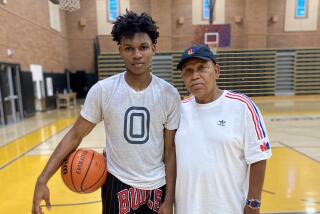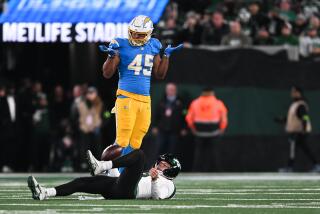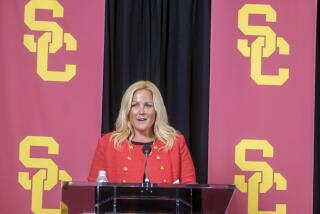New USC grad had meager beginnings but plenty of drive
There are journeys and there are journeys. Nana Numapau’s has been long.
He was born in a village in Ghana. He just earned a graduate degree in Los Angeles.
He came here in 2001 at age 19 and worked for years before taking his first class. He hawked shuttle bus rides at LAX. He sold electronics at Best Buy. He scraped and scrambled and sometimes barely managed.
On Friday, as president of his class at the USC School of Pharmacy, he stood on a stage and delivered a commencement address.
“I keep pinching myself to make sure this is truly happening,” he told his 177 classmates.
Cheering him on as he received his doctor of pharmacy degree were his mother’s sister and his older brother and a former boss and a group of Ghanaian friends who have provided constant support — in from Washington, D.C., and Ohio and London to witness the moment so long in the making.
When Numapau was a boy, he had one pencil for school. He rarely sharpened it because sharpening shortens, and that pencil had to last him for years. To keep from wasting notebook pages, he drew a line down the center of each one and in tiny letters, first on one side and then on the other, wrote down only the most important facts, storing the rest in his head.
Frugality forced Numapau to concentrate, which he did very well.
His scores on a national exam got him into boarding school, where he could study science and math but where older boys were bullies. So he went to bed after everyone else and rose before they woke up. In the empty classrooms where he hid out, he studied to pass the time.
Numapau’s father had 23 children. His mother gave birth to six. Neither his parents nor his siblings went to college. But he won a spot at one of Ghana’s two big universities.
Numapau’s mother had told him since his early childhood that she hoped he would be a pharmacist, a profession of stature in Ghana. The local pharmacy was where his family got its healthcare. You walked into the shop called Nyankwa, or Good Health, and described what ailed you, and the pharmacist pulled a remedy off the shelf.
His father had died before Numapau started high school, from infection after he stepped on a nail. His mother, who raised him, died just before he started university. She was in her early 50s, diabetic, and lacked the education and the medicine to control the disease.
After her death, when it came to school, “my soul wasn’t in it anymore,” Numapau said. Then he got the idea to go to California, where an older brother had settled. “It seemed on TV the worst off here was almost better than the richest in Ghana,” he said.
So Numapau gathered enough money from family and friends to buy himself a plane ticket. He arrived so eager that he got his first job on the curb at LAX. He was waiting for a shuttle bus to take him to his brother in Inglewood when he started chatting with one of the bus company’s employees, who was from Kenya. He asked him how the job was and decided he could do it too. Right there and then he started to call out to customers, while a supervisor looked on, impressed.
The next day he was back on the curb earning a paycheck — though he didn’t know where Long Beach was or how to pronounce Pasadena. The company then offered him an office job — in data entry, logging trip information. He didn’t mention that he couldn’t type and had never used a computer.
He figured it out, as he would a few months later when he left for Best Buy, which hired him to sell laptops and desktops.
“Welcome to Best Buy,” he’d say. “How can I be of assistance to you?” At night, he read about gigabytes and RAM because he had no computer to learn on. Before long, he was winning sales awards and promotions. Best Buy could have been his life. Instead, he started researching what he would need to get into pharmacy school.
He took classes at various community colleges, squeezing them in between work hours. He got around having to take introductory courses by convincing professors to test his knowledge.
In 2007, he transferred to UCLA, still working full time. When he got 36% on his first midterm, in advanced inorganic chemistry, he searched out help, studied harder and got an A on the final.
When it came to applying to pharmacy school, he nearly skipped USC until a friend pitched in to cover part of the fee. He was stunned that he got selected for an interview, and by the power of the professor’s first question.
She asked him to tell her his journey. Before he could stop himself, Numapau was crying. That he had traveled such a distance suddenly hit him hard. The professor kindly brought him tissues.
There are journeys and there are journeys. In his speech, Numapau called each of his classmates’ “equally fascinating.”
Soon, his journey will take him to Indianapolis, where he’ll study health outcomes as part of an Eli Lilly Fellowship. He hopes in his career to focus on his home country and others like it, to use his knowledge to stop other mothers and fathers from dying of ills that could have been prevented or treated.
In Indianapolis, he won’t have to get a job on the side. He will be paid, he says, more than enough. Still, when he takes notes he will draw a line down each page, and he will take his time filling each side.
It is force of habit now, he says, but habit has served him well.
Follow City Beat @latimescitybeat on Twitter and at Los Angeles Times City Beat on Facebook.
More to Read
Start your day right
Sign up for Essential California for news, features and recommendations from the L.A. Times and beyond in your inbox six days a week.
You may occasionally receive promotional content from the Los Angeles Times.







